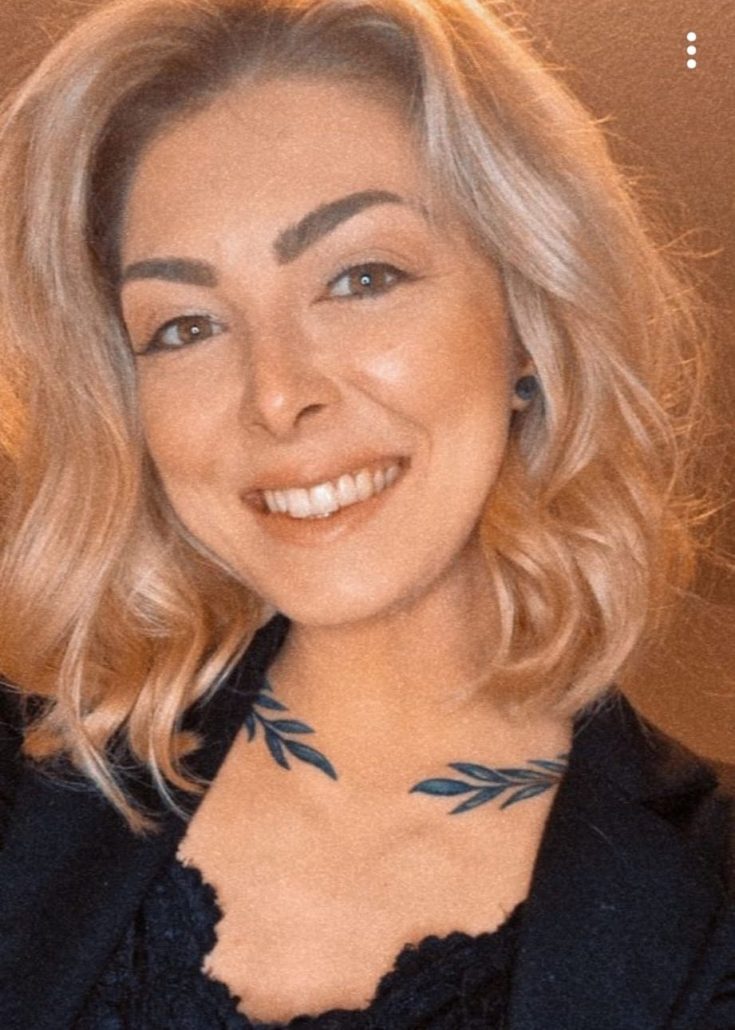“You have to force yourself to rest!”
Interview with Endometriosis Patient Melena
Melena has been grappling with excruciating pain ever since her first period. Initially brushed aside as hormonal fluctuations during her teenage years, it was only seven years later that she was diagnosed with endometriosis. In this interview, she candidly discusses her personal and professional journey, shedding light on the unique challenges posed by this relentless condition.
Hello, Melena. We appreciate your willingness to share your story with us today. Could you please introduce yourself?
Melena: Of course, I’m Melena Milde, 26 years old, hailing from the picturesque North Frisia, just beyond Sylt. I work as a full-time interior decorator and dabble in antique furniture restoration on the side.
What significance does endometriosis hold in your life?
Melena: Endometriosis represents a formidable life challenge for me.
Please walk us through your medical journey to the definitive diagnosis. What were the key events during that period, and what was the most challenging aspect for you?
Melena: It’s estimated that I’ve been living with endometriosis for thirteen years, although I’ve only been aware of it for the last seven. It all began with my first period when I experienced relentless pain. Surprisingly, things seemed relatively fine for about a year, but I had unusual bleeding. I discussed this with my parents, and we assumed it might be an adjustment phase at the start of my period. However, I ended up having nearly continuous bleeding for an entire year. I eventually sought help from a gynecologist and explained my situation, and he found it quite perplexing. Initially, he suggested putting me on birth control pills as a temporary measure. That was a terrifying experience for me. Despite my efforts, my period persisted without warning, making it a constant source of apprehension.
Seven years ago, I commenced training as an interior decorator in Rendsburg. During one school day, I experienced an unsettling episode – intense abdominal pain struck, and I urgently needed to use the restroom. To my dismay, I had already bled through, causing considerable discomfort. I felt lost, unsure of how to handle the situation. The bleeding was so heavy that it threw me into a panic. I promptly visited a gynecologist, where I shared everything, and she suspected endometriosis. Subsequently, I embarked on a journey visiting various gynecologists across North Friesland, from Denmark to Rendsburg, yet none believed me. Compounding the situation, my bleeding mysteriously ceased whenever I saw a gynecologist. After consulting a specialist in Kiel, Dr. Dreyer, who recommended a laparoscopy, the operation confirmed the presence of endometriosis. It was a monumental shock for me, and I shed many tears. When I recount this to friends, they find it difficult to fathom. I’ve often heard the phrase, “You don’t look sick at all,” and I’ve stopped justifying myself. I’ve explained my situation countless times. There are moments of beauty amid the challenges. There are days, weeks, and months when I feel well. But there are also deep lows where I seek solitude to grapple with my thoughts. Many people fail to understand this, often attributing it to a mental health issue. It’s not always a matter of the mind.
How did your friends react when you had to cancel plans due to your condition?
Melena: Initially, when they weren’t fully aware of my situation, they would often inquire about the reasons behind my cancellations. In those moments, I would offer to explain it at another time, not in the present, because I needed to come to terms with it first. About four years ago, I had to cancel another plan, and many people suddenly stopped reaching out. I eventually asked if everything was alright because I hadn’t heard from anyone. This prompted them to seek clarification and explanations. So, I laid it all out and emphasized that I genuinely wanted to spend time with them but sometimes couldn’t due to my health. Afterward, I sat there calmly, observing their reactions. One of my friends burst into tears and asked me, “How do you cope? How do you manage this every day?” I didn’t allow my emotions to surface regarding the topic for a long time because it always threw me off balance. Whenever endometriosis resurfaced, it brought back excruciating pain. My job involves substantial physical labor. I lay floors, plaster, and upholster. I need a lot of strength for this work, and I often didn’t let my discomfort show, fearing it could jeopardize my job.
How did your parents and others in your life handle it?
Melena: Since my parents are professionals, and my father possesses substantial medical knowledge, they delved into understanding the disease. They spent nights researching and even advised me to inquire about endometriosis at my appointment in Rendsburg. I also had a long-term partner until a few months ago. We were together for six months when I received the diagnosis. After the surgery, the topic of pregnancy came up immediately. Dr. Dreyer didn’t mean to be insensitive, but a gynecologist had broached the subject earlier. I was just 19 then, so it wasn’t on my radar yet. Following another consultation with Dr. Dreyer, I visited a new gynecologist who was also well-versed in endometriosis. When I arrived, he mentioned that I had to get pregnant immediately or I’d have difficulties with it later. I sat there, unsure whether to laugh it off or roundly dismiss it. The topic of children lingered between me and my ex-partner for quite some time. Over the last three years, we both decided to plan for children, but it never worked out. After each failed attempt, we would try to downplay it so we wouldn’t become overly emotional. I would break down if my partner weren’t present for the tests. Eventually, you reach a point where you give up. It also became a sensitive topic among friends at a certain point. When friends became pregnant, some hesitated to share the news with me because they were concerned they might hurt me with their happiness. I’m genuinely thrilled for them, but there are fleeting moments when you think, “Yeah, that’s wonderful.” However, you understand you can’t think that way because it’s not you. Then it’s just despair because you yearn for it so badly.
It’s not envy at that moment, either. I can empathize with that. A friend of mine from my school days recently had her second child. She didn’t communicate much about it, and suddenly, there was a second baby. Whenever she mentioned being pregnant or shared her joy at becoming a mother again, I would cry, genuinely happy for her. However, amid that happiness, a thought would cross my mind, “You’ve always had everything, anyway.” This friend faced no family issues; everything always fell into place for her, her family was financially secure, and she had all the opportunities. So, I thought, “And now you have two babies.” I was overjoyed for her, but simultaneously, I reflected on all the challenges I’ve faced in my life, including endometriosis. These questions kept resurfacing, “Why me? Why do I have to deal with yet another hurdle? Why can’t I experience something beautiful and be lucky like everyone else, for once?” When the pregnancy test showed positive, I told myself to remain composed and not get overly emotional. I visited the gynecologist to confirm the pregnancy, and it turned out to be another disappointment.
Did you receive guidance or support from the clinic during your attempts to get pregnant, or did you mainly rely on your efforts?
Melena: Following each surgery, I eagerly awaited the green light during my follow-up appointments. Eventually, I asked what more I could do or take, as one tends to explore every possible avenue. Their response was, “Please try the natural way.” So, after each surgery, I was advised to keep trying until I succeeded, with the instruction to contact them if anything seemed awry. I began taking folic acid, which was the extent of my efforts. However, it simply never worked. Over time, you become weary. There comes a point when you no longer feel like attempting, yet you hold on to the hope that someday it will work out. You can’t afford to be pessimistic about it because that would only hinder your chances.
Have you given up your desire to have children because it has not worked out so far, or have you come to terms with it?
Melena: Since I no longer have a partner, it’s not a consideration. I’ve endured the back-and-forth, the pain before and after surgery for so long that I reached a point where I wondered why I couldn’t just have it all removed.
What daily routines or habits have you adopted to improve your quality of life?
Melena: I practice yoga and make a conscious effort to reduce stress. This isn’t solely related to endometriosis, but I find it crucial to find calmness. I allocate one to two hours each day solely for myself, free from cell phone distractions. Anything else isn’t sustainable. You must make an active effort to attain that sense of tranquility.
That is a valuable insight, as it is easy to let the demands of everyday life overwhelm us at times.
Melena: It’s a lesson I had to learn the hard way. I spent considerable time being too harsh on myself, stressing out, and eventually, my body reached its breaking point. There are numerous external pressures from people and doctors, but I also had to learn to make decisions for myself. We are still the masters of our bodies, and many tend to forget that. It’s essential to establish boundaries for yourself, even at work. While I still engage in physically demanding labor, there are days when I recognize that it’s beyond my capacity, and I communicate that to my employer. He’s aware of my condition and occasionally intervenes when I attempt to carry a twenty-five-kilogram bag of putty up to the third floor, for example.
Is there a “golden rule” or essential advice you want to share with other women?
Melena: I would always recommend visiting an endometriosis center, whether you’ve already received a diagnosis or merely suspect you have endometriosis. Consulting a specialist is crucial. Taking time for yourself is vital when you’re not feeling well. You need to be more attuned to your body’s signals, recognizing when you’ve reached your limit and when you’ve surpassed it. For instance, fainting is a clear “stop” signal from your body; it’s a warning sign. This is the limit. Unfortunately, many people don’t take it seriously, but listening to your body and granting it the rest it requires is essential. Another point is that you don’t need to justify having this condition. It’s not a choice; no one selects any illness.
- “Take yourself and your endometriosis seriously. You are not imagining things!” - 7. November 2023
- Interview with Endometriosis Patient Nina - 7. November 2023
- Interview with Endometriosis Patient Nina - 7. November 2023


